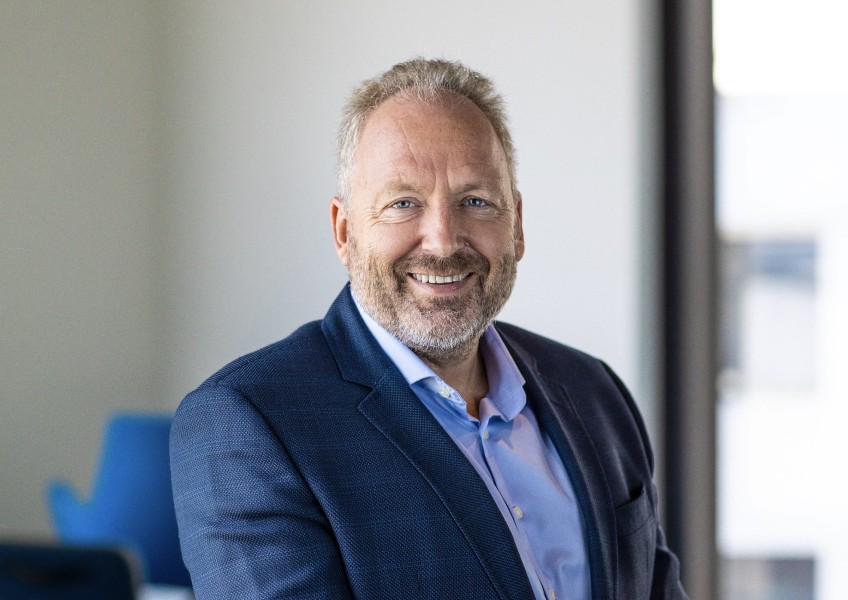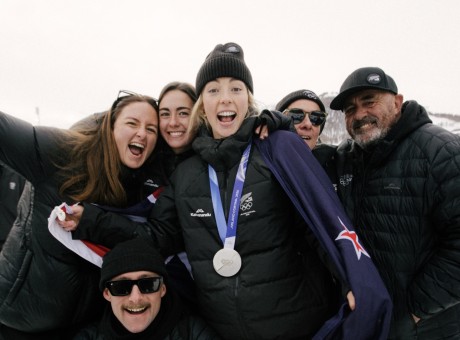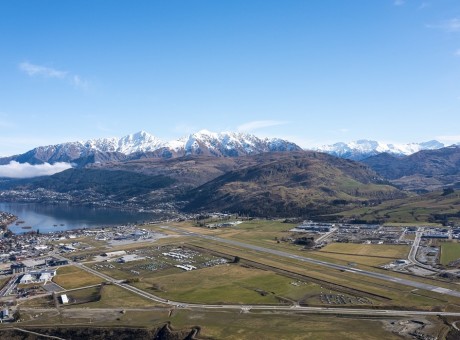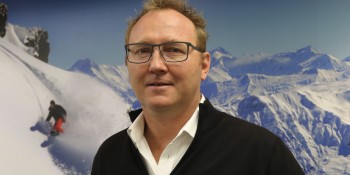Rod Drury: privatisation the best way to get things done

This long form interview with local resident and leading entrepreneur Rod Drury originally appeared as Crux paid subscriber content. Arguably one of NZ’s most innovative and successful businessman, the NBR calculates his wealth at close to $1.5 billion. The NBR also describes Drury’s new property near Arrowtown, a 2,200 square metre house on 29 hectares of land, where they says there’s a bunker style building for global leaders and top tech execs to meet. He’s a local philanthropist but in this long form interview with Crux he reveals a deep desire not just to contribute to the local community - but change it for the better. He talks about why - and, most importantly, how. The conversation started though around the controversial Coronet Village/Gondola that Rod Drury is linked to.
Crux: So the new mountain bike/gondola, and potentially 780 home village, at the foot of Coronet Peak - who’s original idea was that?
RD: It was interesting actually. 'cause we'd been doing all this conservation work and planting and trail development in the three areas. Mount Dewar, Coronet Peak, and the New Coronet Forest. A friend of mine in Wellington said, ‘Hey, that'd be the perfect place for a gondola’ And I was like, actually, yeah, it is interesting. And so I rang Nigel Kerr who's the ski field manager, and said, ‘Hey, Nigel, what's the latest gondola thinking? And he said, well, funny you should ask, because he'd been approached by Ben (Farrell) the planner on behalf of Bernard Cleary (the landowner) to look at that themselves. 'cause they were looking at ways they can monetise the value of their farm. So I made contact. And so a couple of groups had sort of come up with the idea at the same time.
And so I said I'm kind of interested. I could be a funder of that. And then, the fast track process happened, and as you know we took a bit of an open church approach. We knew there were a few schools who were looking at doing a few things. And we thought maybe there'd be a bike thing. So our approach was, Hey, we don't really know how fast Track works, but we're gonna be paying for the consultant. So everyone put some ideas in there and then we'll see what happens and kind of work things out afterwards - 'cause it was on a quite a short timeframe. And then of course, the confusion that happened, and I understand it, people thought we endorse everything, but we just really hadn't - we'd just put our ideas up together.
Even the 800 homes took us a bit by surprise, but it's water under the bridge. The positive upside of it has actually been a catalyst, a really good discussion around creating a long term plan for the area. And Jana Davis from Te Tapu o Tāne has been instrumental in working with the local community on that plan.
So we're able now to take stock of the work they've been doing and make sure we're getting a really good buy-in through all the stakeholders of anything that happens in the future.
“We are looking at our relationship with Soho and QE2 (land custodians) that may include a revenue share to provide sustainable funding. But with some of the other projects we've been doing looking at Queenstown infrastructure we've come to the conclusion that it would be difficult to do a gondola on its own unless it was part of an integrated transport network around Queenstown.
So my focus for the last few months working with Ross Copland who used to be the CEO of the Zealand infrastructure Commission and we've been looking at how do we solve the broader Queenstown traffic problems.
The new gondola would need to be part of that integrated system. So we've been working with the Otago Regional Council on the question of buses and looking at other technology alternatives as well for solving our public transport issues.
Crux: So if you get this right, you're virtually inventing and building a whole new community from scratch. But if it gets bogged down in the weeds, it just becomes, you know, a bit of a mess? You’re hoping for the best and that it all has a good ending?
RD: “Well, no, we're not, we're not hoping for the best. We're actively leaning into these issues. So one of the things we've been doing is working on a regional deal. So identifying the bits of infrastructure that need to be fixed in Queenstown.
And then collaborating with central and local government, especially around more planning. There's a, there's a model called PAT (Population Affluence Technology) which is how you scale communities - as population grows using technology. So you can't use the old technology and keep the same lifestyle, which we see with our local transport at the moment. I mean, if you think about it, we've actually gone back in a major way with transport now. You can't freely drive around the basin now at many key times of the day.
It's actually painful now. So we've lost our quality of life because of lack of planning. So I think we're at a point where those of us who are already motivated to make Queenstown amazing and have a strategy are now leaning into solving these problems.
We've been looking at alternative transport solutions, and most importantly, how we fund them. How do we unlock a lot of those (overseas) sovereign wealth funds that are looking for green infrastructure investments? So there's quite a bit of work that's been going on to solve some of these major transport problems, which we haven't yet addressed in Queenstown. Our lack of action has led to, I think, a major degradation in our standard of living, which we all experience every day.
If we can be a test lab for some of these new solutions and use our thin layers of government to get a few projects underway. If we're early and brave, then we could have an amazing world class public transfer network, communications network, electricity networks and could get more investment than we would assume - because we've become this test lab and this perfect site to showcase.
We are very confident we can attract funding if we can get the kind of projects that are good to go. So a lot of the work we've been doing behind the scenes over the last six months have been getting projects to a fundable state and socialising what we are doing with local council and with central government.
I just think there's this awesome opportunity to make Queenstown a test lab for these things. But what we've also been doing is you know, been involved with a lot of philanthropy around biking. We are now working on a few new key projects that are part of that story. So Coronet Forest for mountain biking - we've put additional funding into the Trails Trust and we are focused really closely now on having a full Queenstown to Arrowtown ride and have been looking also at some new commuter trails. Now we've built the Tucker Beach Bridge we know what these smaller bridges cost, we are looking at how we can we get from Lake Hayes Estate then come in down near the school and also connect up all those Hanley's Farm and Jack Points kids as well.
So we're actively working on that as a project. And I have put funding in place for that. And what that will be is, you know, one of the first real examples where we get people off main Ladies Mile/Shotover bridge in the morning and get kids on bikes riding to school. I’m being very active on a whole lot of those projects as well. And the connection between these new school and commuter trails and the mountain bike trails has been really quite motivating. So now we're thinking, okay, well it's relatively cheap infrastructure. How do we push that ahead?
We've got an amazing community, a beautiful open air lifestyle and active transport makes sense for many of us. And with the work that Nadia and Carlos are doing at Royal Burn, this whole idea around short food chains and what foods work locally, there's a little bit of a pillar that's developing around Queenstown being a blue zone, and which is another pillar I think that brings this vision of what we have together.
My mountain bike philanthropy has been very successful so now we're swinging a little bit more into that active transport infrastructure because you know, we've been waiting for a long time. Waka Kotahi slowed us down a little bit 'cause they were gonna do a new bridge over near the school. But they did'’t have any money to do that. So these are things that are bite-sized enough that our community can raise money. With a bit of help from philanthropists, we can actually get some of the stuff going. So we're kind of not waiting anymore. We're just getting into it and getting things done. And, and those are good, exciting projects. So, you know, the new Tucker Beach Bridge, it's all community funded and the new tunnel that the Trails Trust has done an amazing job of that. And now we're just trying to connect the dots so you could ride, eventually all around the district and it will be just an incredible experience that everyone who comes to Queenstown will wanna do.
Crux: Listening to you talk, Rod, its like you have just started something that is building momentum, doesn't it? You know, one thing leads to another, and I can sense already you've got quite a bit of momentum and its going in a positive direction.
RD: Well, we have, like, I had a really lovely chat with Jana Davis from Te Tapu o Tānewe - we started working together four years ago and with the cleaning up of Lake Hayes. And, you know, the money we put into that has now just rippled and rippled and rippled into so many opportunities and new jobs and, and those things through the basin. So we're bringing this long-term thinking, this intergenerational view, taking a custodial view of the land is one of the things that's really special that's going on in the Whakatipu right now.
Crux: Do you think New Zealand has lost its way a little bit? What you are talking about sounds like a new type of future. A new way of doing things. Would you agree?
RD: I do - I completely agree. New Zealand has lost its vision. It's lost its ambition. Yeah. And we've had, um, you know, we had 60,000 of our most talented people leave the country over the last few years. You know, in Auckland they were running job fairs and radio advertising to lure people to Australia. So we've absolutely been raided and, you know, a lot of our most ambitious people have gone 'cause they're the most mobile. Right.
I'm hearing there may be some immigration changes in February. I think with the global political situation, it's crazy that we're not welcoming in the best and brightest.
If we can, you know, I think geopolitically, there's a huge amount of people that would love to be here. So even if Queenstown was its own economic zone, we could be absolutely bringing in the world's best and brightest, but for some reason we're not having that discussion. No. We're talking around it, but why isn't that like one of our big strategies, replace those 60,000 people and, um, get that investment coming in. Like, I'm getting three or four emails a day from Edmund Hillary Fellows and their network saying, Hey, how do we get to New Zealand? How do we get to New Zealand?
I think we're already packaged. They want to come in, we're just not letting them in . So it's like, let's have a discussion around whether we want people in. What's the extra tax they need to pay to come and be able to build and buy here. Yeah. And it could be something around, you know, one of the barriers is being taxed on your worldwide income, but there may be some stuff we can do there so that, you know, we just think about the New Zealand income or something. But these will be positive contributors to our society.
Crux: But is part of the problem in New Zealand is that we've just made easy things difficult and built all of this bureaucracy and, you know, barriers to getting things done? Is it the answer that you can take control as citizens and say, this is our project, we are doing it, and just take no nonsense? Or do you think that that bureaucracy could still stop you even though you're, you know, you've got well constructed ideas and you've got funding?
RD: Well, let me answer, answer it this way. So all this is pretty new to me, right? I'm a software guy and export and stuff, and now I'm living in Queenstown and it's awesome. As I'm getting to know people and getting involved with projects what I see then is this is this massive bureaucracy that stops things from happening. And there seems to be some really good people around, but yet there goes into this amorphous blob inside council that make things really hard and then pass things to consultants.
How can it take year, a year or two, to get something that should be done in 30 days. And that just stymies investment. And then I've started pulling the string on this, and then it's - I couldn't find an organisation chart on the Queenstown Lakes District Council , like who actually are the people?
Who are the key people that are doing it? And surely the, my understanding of how local politics should work is you have the mayor's sets of vision and is the, you know, customer facing person and listens to the community and gets the desires of the community. And then the executive should be supporting that vision. They should get onto it and be helping and enabling things to happen.
But they don't, they from, from all the feedback I get, people are very, very frustrated. And I think now we're getting to a point where we are starting to get these projects ready and there's some really good motivated people. I think we're at a point now where we will start pulling the string and finding out why we're being slowed.
It's one of the major frustrations that we lose investment because it's perceived as too hard. So I just don't accept that now I'm in, I'm involved. I'll just keep asking the questions of, you know, why is this hard? Is there an agenda or some conservatism of non-elected officials to slow things down? If they are in the way we have to push a little bit harder on that stuff, but I think we're in a very exciting time. The world is changing so quickly we can't muck around on this stuff.
I think we need to have a, a clear vision and the (council) executive should, you know, either support that vision or get off the bus.
Crux: Is one of the attractions to council of using consultants that it gets the responsibility off their plate?
RD: I think we should just stop that. There should be deadlines and if you (council) are paying consultants, the developers or people doing projects having to foot the bill on all of this. Much better to have managed staff with proper KPIs who are incentivised to clear the stack, not to make work. The perfect thing is if you're a consultant and you can keep spinning things up by putting objections and make people do more work that just doesn't feel right. That seems to be a very common perception out there with people trying to do things in Queenstown.
























